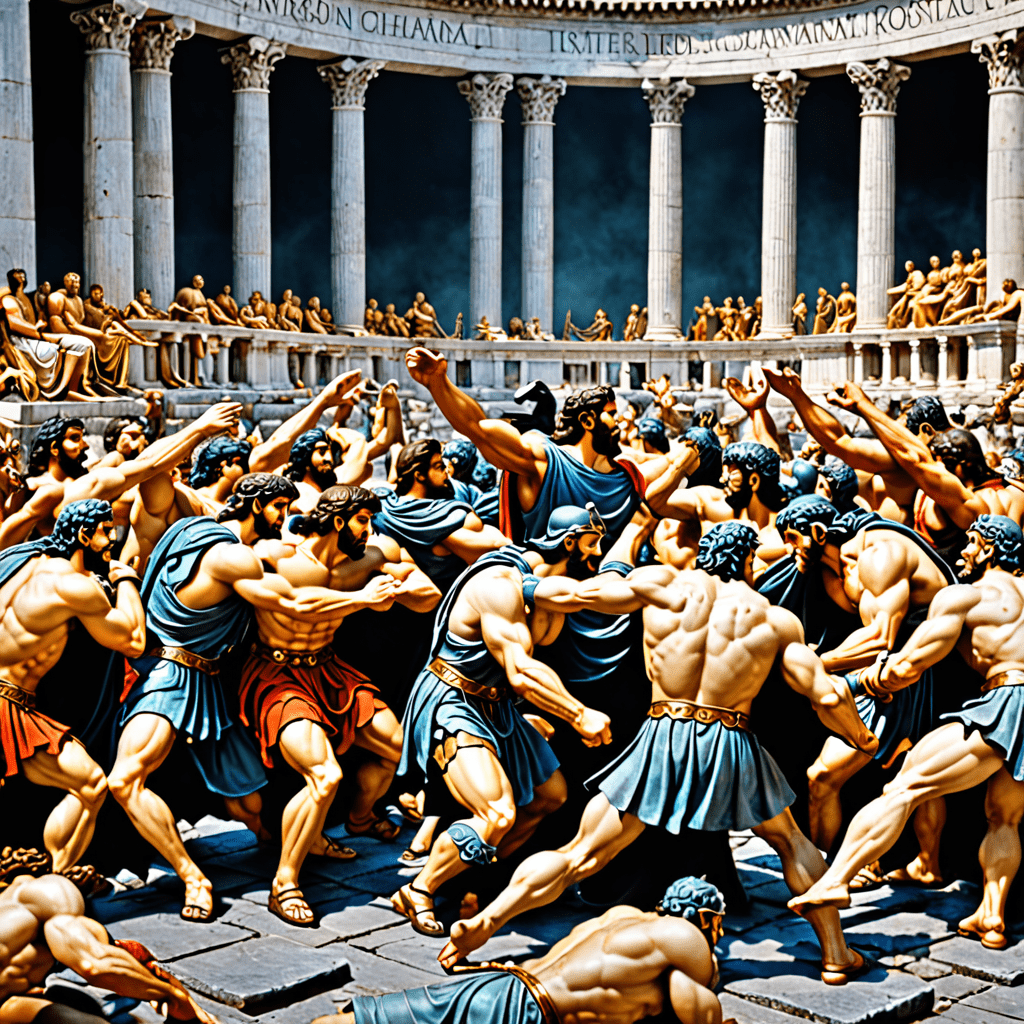Moral Myths That Shook the World: Stories of Transformation
I. Introduction
Moral myths are stories that convey ethical lessons and principles, often serving as powerful narratives that shape human behavior and societal norms. These myths encapsulate the values of a culture and provide frameworks for understanding right and wrong.
The importance of moral myths in human history cannot be overstated. They have guided civilizations, inspired movements, and transformed individual lives. Moral myths often act as a compass, directing societies towards greater morality and justice.
This article will explore the origins of moral myths, their role in shaping human transformation, and the impact they have had on social movements throughout history. We will delve into the psychological and cultural significance of these narratives, examining their lessons and implications for modern society.
II. The Origins of Moral Myths
A. Historical Context of Moral Myths
Moral myths have existed since the dawn of human history, often emerging from the need to explain the world and human behavior. They arise in various forms—folktales, religious texts, and epic narratives—reflecting the values of the societies that create them.
B. Cultural Significance and Variation Across Societies
Different cultures have developed unique moral myths that resonate with their specific historical and social contexts. For example:
- In ancient Greece, myths like those of Prometheus emphasized the value of knowledge and the consequences of defiance.
- In Indigenous cultures, stories often illustrate the harmony between humans and nature, highlighting respect for the earth.
C. Evolution of Moral Myths Over Time
As societies evolve, so too do their moral myths. New challenges and contexts lead to reinterpretations of traditional tales, ensuring their relevance in contemporary discussions about ethics and morality.
III. The Hero’s Journey: Myths of Transformation
A. The Structure of the Hero’s Journey in Moral Myths
The Hero’s Journey, a concept popularized by Joseph Campbell, describes a common pattern found in many myths. It involves a hero who undergoes a transformative journey, facing trials and emerging changed. This archetype is prevalent in moral myths.
B. Notable Examples: From Hercules to Nelson Mandela
Throughout history, figures like Hercules, who performed heroic labors, and Nelson Mandela, who fought against apartheid, embody the essence of transformation:
- Hercules’ trials symbolize the struggle against personal and societal challenges.
- Mandela’s journey from prisoner to president illustrates the power of resilience and forgiveness.
C. Psychological Impact of Heroic Transformation on Societies
The narratives of transformation inspire individuals and communities, fostering hope and encouraging personal growth. They remind us that change is possible, even in the face of adversity.
IV. The Role of Religion in Shaping Moral Myths
A. Analysis of Religious Texts and Their Moral Lessons
Religious texts often contain profound moral lessons that have shaped civilizations. Stories from the Bible, Quran, and other sacred texts provide ethical guidelines and highlight the consequences of moral choices.
B. Case Studies: The Parables of Jesus and Buddhist Teachings
Two notable examples include:
- The Parable of the Good Samaritan teaches compassion and the importance of helping others, regardless of their background.
- Buddhist teachings on karma emphasize the moral consequences of one’s actions, promoting a life of mindfulness and ethical behavior.
C. The Intersection of Faith and Morality in Myths
Faith and morality are often intertwined in myths, as religious beliefs provide a framework for understanding ethical dilemmas and guiding behavior.
V. Myths of Justice: Stories that Redefined Fairness
A. The Concept of Justice in Various Cultures
Justice is a recurring theme in moral myths, with different cultures interpreting fairness in diverse ways. Myths often highlight the struggle against injustice and the quest for equity.
B. Key Examples: The Story of Robin Hood and the Trial of Socrates
Two significant narratives include:
- The story of Robin Hood, who stole from the rich to give to the poor, emphasizes social justice and the fight against oppression.
- The trial of Socrates, who chose to die for his beliefs, illustrates the importance of individual conscience and the pursuit of truth.
C. The Lasting Impact of Justice Myths on Modern Legal Systems
These myths have influenced contemporary legal frameworks, promoting the idea that fairness and justice should be foundational principles in society.
VI. Love and Sacrifice: Myths that Transformed Relationships
A. The Power of Love in Moral Narratives
Love and sacrifice are potent themes in moral myths, often portraying the depth of human connection and the willingness to endure hardship for others.
B. Iconic Stories: Romeo and Juliet, and the Sacrifice of Antigone
Some iconic narratives include:
- Romeo and Juliet, whose tragic love story highlights the consequences of familial conflict and the power of love.
- Antigone, who defied the king to bury her brother, exemplifies loyalty and the moral obligation to family over state.
C. Influence on Contemporary Views of Love and Sacrifice
These stories continue to shape our understanding of love and sacrifice, influencing modern relationships and ethical considerations.
VII. Myths of Redemption: Transformation Through Forgiveness
A. The Process of Redemption in Moral Myths
Redemption narratives often focus on the possibility of change and forgiveness. They illustrate that individuals can overcome their past mistakes and seek a better path.
B. Examples: The Prodigal Son and Les Misérables
Two notable examples are:
- The Prodigal Son, which tells of forgiveness and acceptance upon returning home after a wayward life.
- Les Misérables, where Jean Valjean transforms from a convict to a compassionate man, emphasizing the power of mercy.
C. Societal Implications of Redemption Narratives
These myths foster a culture of forgiveness and understanding, encouraging people to embrace second chances and personal growth.
VIII. The Role of Myth in Social Change Movements
A. How Myths Inspire Activism and Social Justice
Moral myths have historically inspired social change movements, providing narratives that galvanize communities and promote justice.
B. Case Studies: The American Civil Rights Movement and Feminism
Key movements influenced by moral myths include:
- The American Civil Rights Movement, where figures like Martin Luther King Jr. used stories of justice and equality to inspire action.
- The Feminist Movement, which has drawn on narratives of women’s rights and empowerment to challenge societal norms.
C. The Power of Narratives in Mobilizing Communities
These myths serve as rallying points, uniting individuals around shared values and goals, crucial for effecting change.
IX. Critiques and Misinterpretations of Moral Myths
A. The Danger of Misusing Moral Myths
While moral myths have the potential to inspire positive change, they can also be misused to justify harmful actions or ideologies. Misinterpretations can lead to dogma and intolerance.
B. Discussion of Counter-Myths and Their Impact
Counter-myths often arise in response to dominant narratives, challenging prevailing moral understandings and prompting critical reflection.
C. The Importance of Critical Thinking in Understanding Myths
Critical thinking is essential in navigating moral myths, allowing individuals to discern the underlying messages and apply lessons responsibly.
X. Conclusion
Moral myths have profoundly influenced human history, shaping our understanding of ethics, justice, love, and redemption. They serve as powerful narratives that inspire transformation, motivate social change, and guide individual behavior.
As we reflect on these stories and their implications, it is crucial to approach them with both reverence and critical thinking, ensuring that we uphold the values they promote while recognizing their potential for misuse. In doing so, we honor the legacy of moral myths and their enduring impact on



